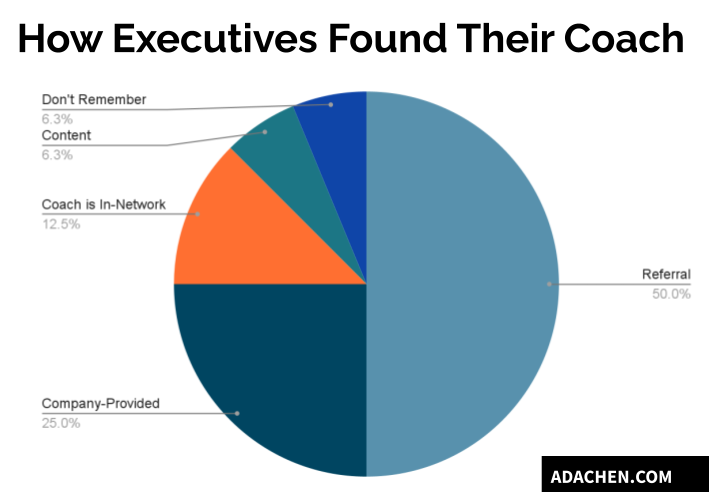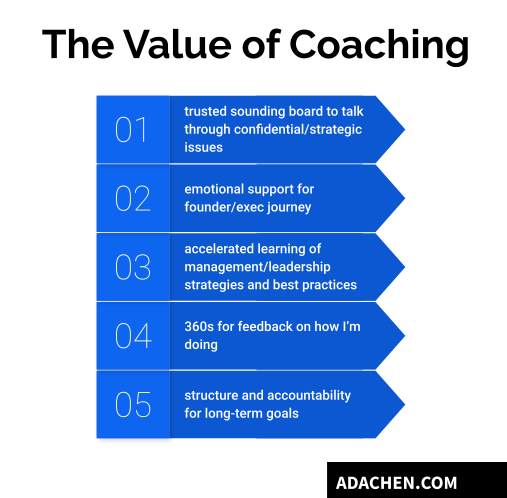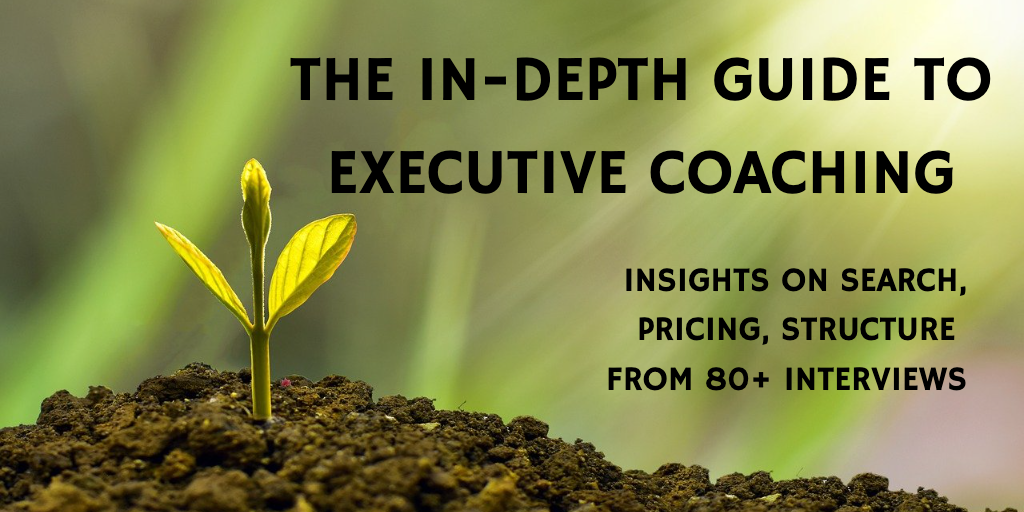I’m excited to share what I’ve learned from 80+ conversations to map the executive coaching industry:
- How are executives finding their executive coach?
- What areas is coaching effective for and how are people leveraging it?
- How much do executive coaches typically charge, and what’s the structure?
- How do you maximize the value from your coaching relationship?
I was curious about these questions, too, in the course of answering these I collected interviews across 13 coaches, 17 founders and executives (Director/VP/GM+) who have engaged coaches, and 50+ prospective coachees.
It would be accurate to characterize this as data-informed but skewed based on my network – almost all tech, US geography, and heavy on founders and mid to late stage execs.
Why do executives seek coaching?
Let’s start with first principles: why founders and executives seek executive coaches in the first place. I also like to think of this as the very top of the funnel – what causes the inception of the search?
What triggers an executive coaching search
The trigger for a coach search broadly falls into two buckets.
The first bucket is searches triggered by a life change or situations that create enough pain that they seek outside help beyond their existing support network. Existing support networks often included co-founders/colleagues, friends, family, therapists, and boardmembers.
Examples include:
- raising funding
- new job or job transition
- conflict with cofounders or execs
- negative performance reviews
The second bucket is searches triggered for self-development, where the primary motivation isn’t resolving a specific problem but a desire to get better.
Examples include:
- curiosity after trusted friend talks about how it’s helped them
- inspired from books like Trillion Dollar Coach
- added coaching into learning & development plans
- learning & development plans
- new coaching benefit offered through work
What executives hope to achieve from coaching
Related to the triggers, founders and executives goals range from very specific to very general. Common themes included:
- Help me solve a problem. They are experiencing a specific problem and looking for coaching to help address it. Examples might include managing conflict with cofounder/team/board, or responding to constructive feedback.
- Help me scale as a leader. They’re sensing a skill or experience gap and want help with it.
- Help me become a better human. Their primary motivation is self-improvement. Similar to taking a class, performing assessments, reading books, executive coaching is another angle for development.
- I’m practicing self care. They are experiencing negative emotions and seeking coaching to address it. Examples include loneliness and wanting a safe confidante, the feeling of being “in over my head,” anxiety, etc.
How do executives find coaches?
I was surprised to find that many executives I spoke with found their coach without running multiple interviews. Of those who found coaches on their own, a full 50% spoke to only one coach before choosing to go with them. A common coach search story might be: “I came to a point where I decided I needed a coach. I asked my friend who they’d used and hired that person as well.”
The primary channel that executives leveraged to search for coaches was referrals. Typically they asked peers or investors for recommendations. Only 6.25% of the executives leveraged search or content marketing as a way to find a coach without a pre-existing relationship or referral.

Executives who had coaches provided through a company program typically spoke to 2-3 potential coaches before making a decision.
So what’s creating this abbreviated search process? There are multiple factors at play here. First, there is the issue of scheduling friction – many executives talked about how difficult it was to schedule and interview coaches, so they wanted to keep the process very tight. This is why even those who did run a process tended to choose less than five coaches to speak to. Related to that, there are a lot of coaches out there and it’s hard to find a trustworthy signal on whether or not a coach is really good.Unlike a restaurant or consumer product, there isn’t a trustworthy review service.
The primary issue that came up again and again is that coaching feels personalized and their decision was based on trusting a recommendation rather than interviewing from a directory. In other words, coaching is an experiential good and you can’t tell if it’s good unless you do it. The investment of not just money but also personal time to meet with a coach and bring them up to speed makes it a pretty high-stakes decision. Rather than trusting a gut intuition from a short initial meeting, executives focused on referrals, or lacking that, reputation.
How do executives choose a coach?
As a marketer, I think about how executives choose as coach as mid-funnel in the acquisition. For many executives who asked their network for referrals or otherwise developed a list of coaches, they only interviewed a subset of those lists. What determines which coaches they choose?
- Social proof – the endorsement of a trusted relationship who had prior experience with a coach can play a key role in outreach.
- Relevant experience – a coach’s relevant experiences played a key role to relatability and potential connection. The sense that the other person could understand and relate to their journey on a personal level (e.g., gender, ethnicity, upbringing) as well as professional (e.g., founder, executive role, core experiences) played a role.
- Specialization – when the executive has a particular class of problem they are trying to solve, specialization can play a key role in seeking out a particular coach. For example, finding a coach who only focuses on b2b SaaS startup founders or who only focuses on cofounder relationships as a category.
- Content – the content available from a coach is a better way to understand the approach a coach takes. Their articles or blog posts are a preview of their approach and structure to thinking.
Of the executives who spoke with more than one coach, they typically interviewed around three coaches.
The primary driver in choice after this point was based on relatability and confidence that the coach would be an effective partner in the relationship. Strong signals that build confidence are the strength of referrer, the coach’s professional background, or the coach’s existing client base.
Interestingly, coaching trainings or certifications didn’t play a role in any of the executive conversations I had as far as driving decision making process.
Executive coaching pricing and packaging
How is executive coaching structured?
In the conversations that I had, executive coaching is typically standardized into two standard package types.
Scheduled Ongoing Coaching
By far the most common structure, many executive coaches schedule an ongoing meeting series for 60 minutes twice per month. There were variations on duration: 45 minute or 90 minute meeting times; weekly or monthly meeting frequencies; or a 15-minute call during the unscheduled week to touch base. There’s also variation on commitment: some coaches are purely month-to-month, while others often require a 6 month minimum commitment.
On a higher end, coaches might also offer on-site visits, facilitating team workshops, or increasing the cadence to weekly for higher fees.
In company-sponsored coaching, a common structure is bi-weekly meetings across a 6-month engagement after which there’s a natural transition point to the relationship.
Packaged Sessions
Some executive coaches will offer a prepaid package of coaching sessions for a set fee. This includes a minimum commitment of sessions and then it’s more fluid on the schedule and frequency in which the sessions get used.
Anecdotally, this appears to be more common in self-paid coaching relationships where cost is a key factor.
How much does executive coaching cost?
The rates which executive coaches charge cover a wide spectrum, and often are driven based on who is paying. Self-paid coaching often costs less than coaching sponsored by the company.
Self-paid price points typically range from $150-500/hr. It’s also more common to see pre-paid packages in this category where sessions are scheduled on an ad-hoc basis rather than recurring.
Sponsored coaching is where the company pays as a benefit. Executives sponsored by their companies often will see price points around $350-500/hr while founders and CEOs are generally at a premium ($500-3000/hr, and up).
How long do executive coaching engagements last?
Many executives talked about the importance of building a strong, trusting relationship with their coach and how integral it is to coaching effectiveness. Building this relationship can take time, so the cost of switching is high. As a result, coaching relationships tend to last. Forty-six percent of executives I spoke to have had relationships for a year or longer, and this percentage goes up if you discount the executives with a coaching relationship that hasn’t reached a year yet.
When executives did end a coaching relationship, it can be driven by a number of factors: the feeling that you’ve learned enough; the coach dissolving the relationship; a change of employment status; or the package structure creating a natural decision point to renew or end.
Is executive coaching worth it?
I asked executives to reflect back on their coaching experiences and stack rank value propositions based on importance to them: accelerated learning of management/leadership strategies and best practices; structure and accountability for long-term goals; emotional support for founder/exec journey; trusted sounding board to talk through confidential/strategic issues; 360s for feedback on how I’m doing.
Asked to stack rank, executives prioritized the feedback and support provided by coaching.

A few additional observations:
- The value of 360s has diminishing returns over time. The first 360 received is really valuable, but repeat 360s tend to have diminishing returns.
- Founders face a unique set of challenges (which I’ve previously written about here) so they value emotional support more. If you look at only founder data, emotional support is the top value provided by coaches.
Asked to describe the value derived from coaching, executives commented on the self-awareness and accountability that coaching delivers.
- Building self awareness
- “You can’t be effective at your job if you don’t understand yourself”
- “I’m a better human, more in touch with values, more in touch with my parts, and I’m better at work”
- “The sounding board became more of the value. I wanted an educated sounding board.”
- Clarity to take action
- “If I received affirmation on something I was struggling to navigate, that was really valuable. Especially holding me accountable to it.”
- “Instead of going back and forth on the same question, they uncover the clues and hold you accountable. It’s like that brutally honest voice that you had in your own head.”
- “Am I being challenged to think differently? Would I be where I am today if I didn’t have this coach?”
- “Coaching helped build confidence and accountability to take action and actually do things. Most value for me came when I had a specific set of actions that I was trying to solve a problem that I had.”
- Self development
- “I learned to appreciate leadership better after coaching. It helped me understand it’s not just structured thinking that makes them special. It’s the way they connect their personality and passion.”
- “Coaching is super useful to see how my behaviors are changing and roleplay how to be better.”
- “Insights and takeaways where they’re sticking and usable in terms of day to day life”
- Clarity and positivity
- “I leave sessions feel better – if I’m stuck I’m unstuck, if I’m feeling negative I feel more positive”
- “The hour has to feel like you go more out of the hour than you gave it. if the hour goes by, and you walk out of the room feeling with same way – assesses whether that session goes the same way. It was more how they help move my problem.”
- Emotional support
- “Just knowing that this is the same problem that many other people to go through, and then using that to hone in on the specific issue. This is what you can’t get from introspection that’s differentiated.”
- “Emotional support in helping solve a problem, when I’m down they help me get picked up.”
- “It’s a safe space to admit negative feelings and motivate myself for future action”
By and large the executives I spoke to appeared satisfied with the value they received from executive coaching. There were two notable exceptions to this. In both cases the executives felt the coaching content was generic and cookie-cutter. However, one executive felt that the content wasn’t tailored to meet her objectives. For the other, they felt it wasn’t useful until they’d defined a more concrete goal.
How do you maximize your coaching experience?
I asked executives what advice they’d offer to someone who is trying to make the most out of their experience with an executive coach. Here are some themes that they shared.
- Start with a problem you’re trying to solve. Enter the coach search process with a goal in mind or a problem you’re trying to solve for. Having that clarity will enable you to be more targeted about what you’re looking for. While there are a lot of great coaches out there, it’s helpful to find one who is problem-fit centered and has relevance to your goals.
- Have multiple conversations. Despite 50% of the interviewees selecting a coach without additional conversations, many recommended having multiple conversations with coaches to get a better sense of fit. Fit includes not only the rapport you have with the coach, but also if you have preferences on learning or communication style. One suggested talking to at least 3 no more than 5 potentials, so you can get a better feel for your options.
- Focus on fit over prior experience. The success of the coaching relationship is a very personal relationship, so it’s important to feel that the coach is relatable and has the right sense of chemistry. Executives talked about rapport, work style, chemistry, emotional connection as a real factor in ensuring a great fit.
- Coaches are not one size fits all. It’s important to think about having multiple coaches, depending on the topic area or the stage of career you’re in. Just like an athlete has different coaches for different parts of their game, it may be optimal to think about coaching relationships in a more transitional and goal oriented way.
- Find hands on help. When possible, push coaches to help you on real-world experiences and in a more hands-on way. The slide decks that the coaches provided were not helpful, but talking about specific situations was actually really helpful. It’s also useful to roleplay different situations or ask them to observe.
- Get one in advance. You may want to seek out a coach when times are good, not when they’re bad. Having an established relationship will enable coaches to be better positioned to be helpful to you.
There you have it! While there was a lot of data available from the interviews, this summary encapsulates the high-level takeaways from the conversation.
In the future, I’m planning to continue have continued this series with what I’ve learned about coaching (part 2) and how to find an executive coach (part 3), so if you’re interested in this topic please subscribe for more.
